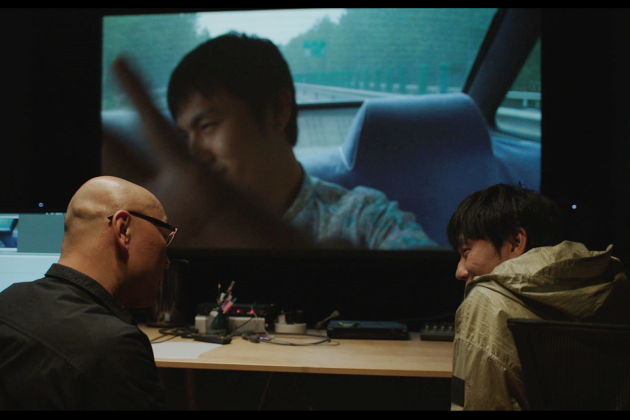‘An Unfinished Film’ Review: Lou Ye’s Docufiction Covid Chronicle Captures the Strange Slippage of Time

Nostalgic docufiction that morphs into a lockdown thriller, Lou Ye’s “An Unfinished Film” is the second work at this year’s Cannes Film Festival (alongside Jia Zhangke’s “Caught by the Tides”) in which a “Sixth Generation” Chinese filmmaker has repurposed their old films to create something new. The line between reality and drama blurs as Lou genuinely re-discovers years-old footage, and proceeds to follow a fictitious film crew completing an abandoned project, only for China’s severe Covid-19 lockdowns to interrupt their work, as well as life in all its rhythms.
Few films have so skillfully captured the way Covid caused such traumatic temporal disruptions in its early days, wherein sudden changes in physical and emotional routine caused time to both stretch and collapse. The foundation for this dissonance is laid when Lou, by way of director character Xiaorui — played by Mao Xiaorui, Lou’s assistant director on several films — begins revisiting his abandoned indie drama starring the now-successful actor Jiang Cheng (Lou’s long-time collaborator Qin Hao), the de-facto protagonist of “An Unfinished Film.” As the cast and crew reunite in late 2019, after a decade apart, old footage played in an editing bay — collected from outtakes and B-roll on Lou’s “Souzhou River,” “Spring Fever,” “Mystery” and “The Shadow Play” — serves as an anchor for conversations about how each of them has changed, including playful comments about Xiaorui’s weight gain. At the outside, the characters’ sense of time and its passage is linear, definitive, and shared.
More from Variety
By the time the old project is resurrected, it comes to represent a second chance for all involved, but news stories about an illness in the nearby city of Wuhan ensure that a bitter irony hovers over the proceedings. As more rumors trickle into their hotel, Lou’s numerous, closely-placed cameras capture the crew members’ varying responses to the looming threat as they fall out of alignment — some take it seriously, while others would rather push to finish the film — until the building is placed under strict lockdown.
Things accelerate, as Jiang searches for a way past local security so he can reunite with his wife and newborn child, but the situation outside the hotel’s doors evolves too rapidly to comprehend. During this escalation, Lou and cinematographer Jain Zeng keep numerous cameras running simultaneously, capturing thrilling impromptu scuffles and negotiations, which editor Jaiming Tian expertly weaves together in chaotic fashion, reflecting the cacophonous breakdown of social order.
As the initial seconds and minutes of this ordeal turn to hours and days, the movie’s fabric evolves in tandem. While the documentary cameras — once acknowledged, but now invisible — remain neutral observers, the frame shifts and contorts to accommodate footage from phone screens and webcams, as these become the safest (and only possible) avenues to communicate. There’s a roughness to sound design as well, which captures the delay in responses as lines of dialogue are heard on both ends of a given conversation (spoken, and on speaker phone), as though “An Unfinished Film” were being live-streamed from some still-unfolding disaster, and the characters were growing further out of sync.
The days turn to hours, which turn to weeks. Life and society begin to transform, with new rituals the cast and crew film from their hotel windows, along with new dangers they observe, as information is kept from them (real viral videos about whistleblowers are also featured). As they slowly find new ways to stay sane and keep themselves entertained, this leads to an upbeat, multi-screen montage set to an acoustic cover of Mongolian-Chinese pop hit “The Fiery Sarlang” — among the festival’s most moving, life-affirming musical moments.
By entwining reality with dramatization to such an inseparable degree, “An Unfinished Film” runs the emotional gamut, with a pulsing naturalism that few films about the recent pandemic (or any real disasters) have ever managed to achieve. In the process, Lou crafts not only a character drama in which crew members play and film themselves — an inadvertent ode to the filmmaking process — but an intimate chronicle of suffering and collective resilience too, as people adapt to new and unfamiliar ways of being, and of seeing the world around them.
Best of Variety
Sign up for Variety’s Newsletter. For the latest news, follow us on Facebook, Twitter, and Instagram.

 Yahoo News
Yahoo News 